Daniel Garber talks with Robert Fisk and Yung Chang about This is Not a Movie
 Hi, this is Daniel Garber at the Movies for culturalmining.com and CIUT 89.5 FM.
Hi, this is Daniel Garber at the Movies for culturalmining.com and CIUT 89.5 FM.
Photos by Jeff Harris.
Robert Fisk is a foreign correspondent based in Beirut, who has covered, first-hand, all of the wars in the middle east for the past four decades. He met with Osama bin Laden three  separate times. Award-winning and highly controversial, Fisk flouts the conventional slant pervasive in western mainstream reporting, and brings things back to the people he’s covering.
separate times. Award-winning and highly controversial, Fisk flouts the conventional slant pervasive in western mainstream reporting, and brings things back to the people he’s covering.
This Is Not a Movie is a new doc that follows Fisk at work, tells his history and background, and  discusses controversial stories and issues. The film is written and directed by Canadian Yung Chang, known for films like Up the Yangtze and the Fruit Hunters.
discusses controversial stories and issues. The film is written and directed by Canadian Yung Chang, known for films like Up the Yangtze and the Fruit Hunters.
I spoke with Robert Fisk and Yung Chang in September, 2019 during TIFF, at NFB’s headquarters in Toronto.
Robert Fisk died earlier this week after a short illness.
August 12, 2011. Temperatures Rising. Movies reviewed: Devil’s Double, The Help, Rise of the Planet Of The Apes, Final Destination, Gun to the Head
Hi, this is Daniel Garber at the Movies, for culturalmining.com and CIUT 89.5 FM, looking at high-brow and low-brow movies, indie, cult, foreign, festival, genre and mainstream movies, helping you see movies with good taste, and movies that taste good, and what the difference is.
It’s getting into high August, and there are tons of movies playing now, so let me just dive right in and tell you about a few of them. I’m talking about two stories about servants who have good reason not to like their bosses, one where an employee is forced to challenge his boss or die, one where a whole class could challenge the people in power, and one where a group of people attempt to challenge… fate itself.
Dir: Lee Tamahori
It’s the 1980’s during the Iran-Iraq war, when Latif, a scruffy, young soldier from a good family in Bagdad, is brought into a palatial mansion. He’s asked whether he wants to work for Uday, Saddam Hussein’s son. Well, not exactly asked: He’s told. If he says no, he, his family and friends will all be tortured and killed. If he says yes, though, he will move into this luxurious palace, wear tailored suits and Rolex watches, drink champagne, drive sportscars, have his pick of the most beautiful women, and hang out at the most exclusive nightclubs in Iraq.
What’s the catch? He’s a near exact double of Uday in height, weight, body-type, and facial features. So he’ll be taking his place at public appearances with the constant risk of being shot at by assassins. So, the movie, (partially based on Latif’s memoir) shows his bizarre double life… as a professional double. This is a violent, scarface-y story with shootouts, coke sniffing, disco dancing, and backstage intrigue.
It’s also a chance for an actor to be or the screen about 140% of the time in the dual roles –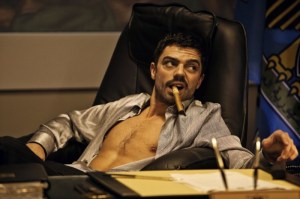 when Dominic Cooper isn’t playing the humble, honest Latif, he’s acting as the profligate, decadent and cruel Uday, and often both at the same time. He does it well enough that the audience immediately knows whether it’s the conceited, aggressive, strutting, whiny-voiced Uday, or Latif imitating him. They walk differently, think differently and have a different look in their eyes.
when Dominic Cooper isn’t playing the humble, honest Latif, he’s acting as the profligate, decadent and cruel Uday, and often both at the same time. He does it well enough that the audience immediately knows whether it’s the conceited, aggressive, strutting, whiny-voiced Uday, or Latif imitating him. They walk differently, think differently and have a different look in their eyes.
Can Latif find a way out of this crazy life? And can he and his secret love – one of Uday’s mistresses – escape the country?
This is quite a violent movie. And while it paints a generally negative view of a whole country, and gives an inaccurate view of women’s status in Baathist Iraq, it can be enjoyed as an apolitical drama and as an actor’s tour de force.
Next, another movie about badly treated servants.
Dir: Tate Taylor
Smart but frowsy Skeeter (Emma Stone) comes home from University to the high-society of heavily segregated Jackson, Mississippi in the early 1960’s. She wants to get herself a job as a writer, see her old debutante friends, and take care of her mother who’s dying of cancer. But she soon sees the world is changing, and is disgusted by how black servants are treated by their rich white employers: demeaned, disrespected, badly paid. They essentially raise the white kids from birth, but rarely get to spend time with their own children.
When Skeeter’s friend Hilly (Bryce Dallas Howard), the reigning top woman in her set, attempts to pass a bylaw making it illegal for blacks even to use a bathroom inside the homes where they work all day, Skeeter decides something must be done.
She befriends Aibilene (Viola Davis) and asks her to tell her own inside story about life in the south. When another maid, Minnie (a comical Octavia Spencer) — known for her cooking skills — joins her project, it looks like their stories might be published as a book.
This is a richly plotted, multi-charactered, story about life in the deep south, and the subtle and overt racism in every aspect of the lives of the people who lived in this era. This isn’t a movie about KKK lynchings or good ol’ boys with rifles. It gives a calmer view of the segregated, Jim Crow days, right when the civil rights movement was taking off. It’s also a richly moving women’s story – not a chick flick — with terrific acting all around, especially Viola Davis, and Jessica Chastain as Celia, a suddenly rich blonde bombshell from dirt poor origins who seeks help from Minnie. It also has great actresses like Cicily Tyson, Cissie Spacek and Alison Janney in the side roles.
overt racism in every aspect of the lives of the people who lived in this era. This isn’t a movie about KKK lynchings or good ol’ boys with rifles. It gives a calmer view of the segregated, Jim Crow days, right when the civil rights movement was taking off. It’s also a richly moving women’s story – not a chick flick — with terrific acting all around, especially Viola Davis, and Jessica Chastain as Celia, a suddenly rich blonde bombshell from dirt poor origins who seeks help from Minnie. It also has great actresses like Cicily Tyson, Cissie Spacek and Alison Janney in the side roles.
Only quibble? Though some of the black characters slip in and out of dialect, the younger white women’s accents don’t sound much like they would have in Mississippi in the 1960s. But The Help is definitely worth seeing if you like complicated dramas, family secrets, frequent plot turns and funny surprises.
 Rise of the Planet of the Apes
Rise of the Planet of the Apes
Dir: Rupert Wyatt
Will (James Franco) is a scientist who works for a multinational pharmaceutical corporation who is developing a new medicine that can repair brain functions. They test it on chimpanzees, and he takes home a newborn one when his mother dies in the lab. But he soon discover his ape, Caesar, is special: he’s somehow inherited the new brain skills his mother had gained from the drug testing, and he’s quickly getting better and better. He learns art, sign language, and better motor skills than any human. Will and Caroline (Frieda Pinto) treat him almost like a son… except for the collar and leash they force him to wear outside. But when Caesar tries to rescue Will’s senile father (John Lithgow) from a mean neighbour, he is taken away by the authorities and thrown into an animal shelter that looks more like a federal prison run by cruel guards.
There he interacts with his own kind and discovers he’s not a human but an ape. Caesar has to decide who he can trust and whether he should wait for his former human father to rescue him or strike out on his own.
This is a really enjoyable movie, with fantastic camera work, a great story, and — though largely animated – believable characters with sympathetic faces. (I’m talking the apes here.) Which is why I was surprised at how awful the CGI’s were in some scenes – jerky toy monkey’s bounding up trees like a bad outtake from a third-rate videogame intro – and how excellent in others. In any case, if you want a fun exciting story, this is the one to see. A thousand times better than the awful Planet of the Apes remake.
Dir: Steven Quale
A group of eight coworkers on their way to a retreat, manage to escape from an enormous collapsing bridge when one of them, Sam, has a premonition and gets them away in time. But they soon discover they were destined to perish, so are being killed off, one by one, in a series of gruesome Rube Goldberg-esque accidents. Who will live and who will die? And will they succeed in cheating death a second time?
What can I say – this is one of my favourite genres of horror movies: bloody gore but without an identifiable villain. Instead, the danger is everywhere — in a leaky pipe, a dropped match, a speck of dust or a misplaced screw. A restaurant kitchen is filled with potentially dangerous flames, knives, and shish kebab skewers. Ordinary life is fraught with danger!
The lines stink, the characters are predictable, the music is corny, and the acting ranges from humorous to forgettable, to excruciatingly awful. But the special effects are flawless, and the pace is just right. It pulls you forward with stress, fear and tension, then lets you back down again, never knowing for sure whether the next shot is a real danger or just a red herring. And the 3D, especially in the multi-leveled scenes on the bridge and on a factory floor, is amazing. This is a great, super-cheezy “B” or “C” summer movie.
the 3D, especially in the multi-leveled scenes on the bridge and on a factory floor, is amazing. This is a great, super-cheezy “B” or “C” summer movie.
It also has the best non-trailer trailer ever, that shows what Final Destination would look like if it were a pop music video recorded on the set of Saved by the Bell — complete with laugh track.
Dir: Blaine Thurier
Trevor (Tygh Runyan) gets away from his own dinner party (complete with creepy, Japanophile swinger guests wearing sleazy kimonos) to pick up a bottle of white wine and talk to his drug dealer cousin, Darren (Paul Anthony). He just wants to give him a bit of help, but he’s soon dragged into this underworld of strip bars, guns and lines of coke. He has to deal with a fickle small-town drug potentate, his deranged guard, and his sexually adventurous, skeezy girlfriend. Can Trevor outsmart the gangsters, rescue his sleazy cousin, and ever get back home to his wife? Or will everything fall apart?
This is a funny, very-low-budget Canadian thriller. Though not perfect, it has great characters, and some manic — but not hammy — performances, especially Paul Anthony channelling the spirit of Don Knotts, dressed as a Vancouver hood.
Devil’s Double and The Rise of the Planet of the Apes are now playing, check your local listings; The Help just opened in Toronto, and Final Destination and Gun to the Head open tonight in Toronto (Friday, Aug 12, 2011). Also look out for You Are Here, opening today at the TIFF Lightbox.
This is Daniel Garber at the Movies for CIUT 89.5 FM, and on my web site, CulturalMining.com
More Underdogs at Hotdocs! Weibo’s War, Guantanamo Trap, Draquila: Italy Trembles, Hot Coffee, Bury the Hatchet, Melissa-Mom and Me
Hi, this is Daniel Garber at the Movies, for culturalmining.com and CIUT 89.5 FM.
Toronto’s Hotdocs, which continues through the weekend, is one of the best documentary festivals in the world. Today I’m going to talk about some more movies about the largely unknown underdogs, in their struggles with huge governments, big business, or with themselves.
Dir: David York
Weibo Ludwig is a devout Christian who lives in a remote, isolated colony with his fellow religious settlers in BC, near Alberta. Their lives are food and energy self-sufficient, but, in the 90’s, things began to go wrong. Goats started having frequent stillbirths, and, when a woman also miscarried, they realized their watershed had been contaminated by natural gas wells built right at the edge of their property.
He was later arrested, tried, and jailed for bombs he had set off at wells and pipelines in that energy-rich Alberta area. This movie follows filmmaker David York who was allowed to film inside their compound.
Is Weibo a religious nut or a devoted social activist? Well, he’s certainly religious, but he’s crazy like a fox. The movie shows some of Weibo’s (and those of his fellow settlers’) frequent brushes with the law and the big energy companies
including run-ins with outwardly conciliatory execs from Encana; the seemingly pointless, intimidating, and relentless police raids of their homes to test things like how many ball point there are on one floor, and how many cassette tapes are on another; and their increasingly fractious relationship with the nearby town, where they have found themselves local pariahs following the unexplained shooting death of young woman on their property.
Folk hero, or deranged terrorist?
Maybe both. I left the movie even less certain than before as to who’s to blame and what actually happened. While a bit slow-moving, Weibo’s war did give a first hand look at a legendary Canadian figure, his family and co-religionists, and the unusual junction between Christian fundamentalism and environmental extremism.
Dir: Thomas Selim Wallner
With the recent killing of Osama Bin Laden, some people are saying that the awful decade between 9/11 until now is finally over. The “War on Terror” has been “won” by the west, and we can turn the page on the whole tragedy and its devastating effect on the American public, and the subsequent hundreds of thousands of Afghanis and Iraqis killed by the US and their allies.
But, inspite of bin Laden’s death, in spite of Obama’s election promises, the prison in Guantanamo Bay, Cuba is still open, with many untried captives still inside. What really happened at Guantanamo, who’s to blame and who got punished?
This film traces four people involved in this awful period: a military lawyer, Diane Beaver, who helped write the notorious memo that declared waterboarding was not
torture; Muniz, a religious Turkish-German Muslim man, who was whisked away from Pakistan due to some miscommunication and tortured in Guantanamo; Matthew, a military judge-advocate, also working at Guantanamo (alongside Diane), who leaked a memo with a list of prisoners’ names and countries; and Gonzalo, an activist- lawyer in Spain who wants to prosecute the people really responsible for miscarriages of justice.
This is a very moving and shocking film with previously unseen footage — not just still photos — and first- hand testimony of what went on in Abu Ghraib and Guantanamo Bay. In an awful Catch 22, it seems the people at the top got away scott-free, the whistleblowers were jailed, the low-level torture advocates were scapegoated but allowed to retire to happy, new careers, and the unwitting victims left without apology or explanation. This Canadian film is an excellent, human look at a difficult and controversial topic.
Draquila – Italy Trembles
In 2009, the small Italian city of Aquilla was struck by a dangerous earthquake which damaged the rennaisance buildings in the town centre, killed hundreds of people and left thousands homeless. The diorector, a comedian and filmmaker uses this disaster to expose the tangled web of corruption, oppression, and scandal at the root of Italian Prime Minister Berlusconi’s empire and its ties to big business, the construction industry Milan, his media empire, the military, police and government, and the Mafia.
Something familiar only to Italians known as “Civil Protection” — a recent government law that allows forcible confinement, exclusive contracts, and strange pay-offs in the name of protection in the case of disasters or threats — has ballooned into a strange and twisted entity that releases unfettered access to government funds, while it gags local government, blocks media coverage, and puts the police in charge. Far from being a temporary measure, it’s occuring daily across Italy, for anything considered to be a “big event” including church parades, housing relocation, and swimming contests.
Comic and political filmmaker Sabina Guzzanti spends most of the movie trying to get into the relocation camps of the earthquake victims, but getting stymied at almost every stop by police and contractors who are loathe to allow public access to anything that might expose corruption or wrongdoing.
And through it all the stoic victims are pushed around like pawns in some international PR game.
Draquila (a reference to all the blood suckers who, laughing immediately after the disaster, gleefully pounced on the disaster as a chance to earn big government contracts) is an enlightening, entertaining and humorous look at the uniquely shady world of Italian politics under Berlusconi.
Dir: Susan Saladoff
When a woman who was awarded millions in a lawsuit after she was burnt by hot coffee at a McDonald’s drive through, her story hit the headlines. It became a staple joke for comedians and talk shows, an episode of Seinfeld, and the focus of citizens’ groups objecting to “Frivolous Lawsuits”. But this movie takes a closer look at these seemingly ridiculous awards.
It turns out — and she shows unbelievably brutal photos to prove it — that the elderly woman was horribly injured by the coffee spill; that she initially asked only asked McDonald’s for reimbursement for her medical expenses (McDonald’s offered only a token $800); and that far from being frivolous, it was an incident that followed repeated corporate indifference to similar incidents that had occurred hundreds of times before and kept secret by the companies.
This movie poses that the whole concept of of the term frivolous lawsuits was coined by PR firms working for huge corporations like McDonald’s in order to cut their own losses and limit future pay-offs. She shows similar cases in the US — including malpractice suits, “forced mediation” and the fact no criminal charges were laid after an employee of a US security firm in Iraq was gang raped; and the case of a judge who was in favour of punitive awards in lawsuits, but was forced to fend off accusations and trials brought down on him by right-wing groups, when he should have been on the bench.
The way this movie handles concepts such as “tort reform” (i.e. opposition to lawsuits), and the parties actually pushing for it, reveals the necessity in the US for lawsuits. The filmmaker says corporate donations target liberal judges, lawsuits are being quashed by large corporations, that lawsuits are the only way for individuals to pay for medical damages, and that forced mediation always takes the side of the big companies not individuals.
But for Canadians and others outside of the US, Hot Coffee is as baffling and arcane as the Italian politics in Draquilla. We don’t have elections for judges, no corporate donations to political campaigns, no US-style extended elections beyond a few weeks, no TV ads for local politicians. In Canada trials are generally by judges not by juries; mediation usually refers to their successfully use in union/ management disputes, in lieu of strikes; and our largely public, one-payer health system, that provides lifetime medical care, cuts out many malpractice lawsuits.
Most of all, there are just far fewer lawyers, per capita, in Canada, and Canadians just aren’t as litigious as Americans. I can see the value now of lawsuits, but I’d be bothered if Canadians ever reached the level of US litigation and courtroom interference in the average person’s lives. And it might have been more believable if it hadn’t been so one sided in its relentlessly positive view lawsuits as a purely progressive force, without any look at the abuse that lawyers themselves may play in this phenomenon.
Finally, two more Hotdocs films that deal with issues on a smaller, individual level.
Dir: Aaron Walker
The annual Mardi Gras in New Orleans has a public, tourist side to it, but also has a deeply ingrained local side full of traditions and customs. This movie takes a look at the “tribes” — competitive teams of Black New Orleans residents — who, with beads and feathers, music and dance, dress in native costumes they design and wear in the parade.
The custom, said to have started with the shelter natives gave escaped slaves, is performed in their honour, with colourful homages to the Indians using mock chants, names and headdresses.
This intensely beautiful, brightly coloured film interviews the elderly men in their various competing clubs, as they recount, using period foootage and pictures, the sometimes violent history of this largely unknown practice. The soundtrack, composed of jazz, blues, R&B and reggae, are as entrancing as the images, in this slow moving, but very visual and aural slice of New Orleans cultural life from the 60’s, through Katrina, until the present.
Dir: Limor Pinhasov
Yael — then known as Jenny — and Melissa, lead a drug-filled, light hearted life as two friends who worked as strippers in a Tokyo nightclub. Yael became a professional photographer in Tel Aviv, while Melissa eventually made her was back to Carolina, to start a very different life. Yael decides to join her here to rekindle their friendship (she still has many videos and photos she had taken of them in Tokyo) and to get her advice on having kids.
This is quite a moving story.
Melissa-mom of the title is indeed a mother — she had left her kids when she went to work as a stripper in Tokyo — and they are now much older and grown up without their own mother. In a dramatically filmed series of revelations, meetings, confrontations, and reconciliations, Melissa’s hidden family secrets are gradually revealed both to her friend Yael, and to the audience. It deals with sin, reponsibility, duty, guilt, friendship, love and family, in an entirely understandable way.
All of these movies are worth watching (depending on your interests). Most of the movies get replayed this weekend, so be sure to come out to see some more great documentaries.
The Hotdocs festival runs from Thursday April 28th to May 8th, and is free – no charge! – for rush seats during the day for anyone with a Student or Senior ID. Check online at hotdocs.ca
This is Daniel Garber at the Movies for CIUT 89.5 FM, and on my web site, CulturalMining.com.
War and Filmic Vocabulary. Movies Reviewed: The Christening, Essential Killing. PLUS Cold Fish, Images Festival
It’s funny how current events can change our whole filmic vocabulary, adding new concepts and words to make images that would have made no sense a decade ago instantly recognizable on today’s movie screens.
Most people immediately think of technology — ipods, digital pics, texting, on-line dates — as the biggest recognizable changes. But, unfortunately, some of the biggest stretches of our visual vocabulary is in images of war, violence and death.
During one of the darkest periods in American history, that started less than a decade ago following 9/11 (and doesn’t seem to have finished), the Bush/Cheney administration started a “war on terror”. Countries were invaded, bombs dropped, and a huge number of suspects were arrested, jailed, tortured or killed. In general,
9/11 (and doesn’t seem to have finished), the Bush/Cheney administration started a “war on terror”. Countries were invaded, bombs dropped, and a huge number of suspects were arrested, jailed, tortured or killed. In general,  these horrific events were kept away from American soil, but done by Americans under direct orders from the government. They also introduced new words and concepts into our vocabulary, that previously might only have been used in horror novels.
these horrific events were kept away from American soil, but done by Americans under direct orders from the government. They also introduced new words and concepts into our vocabulary, that previously might only have been used in horror novels.
Clandestine prison camps, known as “Black Sites”, were set up across Europe and the Middle East. Undocumented suspects, who were sent there to be tortured or interrogated, were called “Ghost Detainees”. One of the torture techniques, in which detainees were made to repeatedly suffer the sensation of death by drowning, is now widely known as “Water Boarding”. And the black hoods put over prisoners (used in Abu Ghraib) are also instantly recognizable.
Canada has also morphed into a nation at war, without consciously deciding to make the change from peacekeeper to bomber. We’re fighting on two fronts now. So today I’m looking at some new movies from Poland (a country that has certainly seen more than its fair share of wars) that examine how war and violence has infiltrated daily lives.
 The Christening
The Christening
Dir: Marcin Wrona
The movie opens with a soldier, face covered, being chased down by cops who beat him up, and arrest him for unknown reasons. Then flash forward – Janek (Tomasz Schuchardt) is visiting his army buddy and best fishing friend, Michal (Wojciech Zielinski). They’re together again to guzzle vodka and do Maori war chants. When they go fishing, they use their old military experience – throwing grenades into a lake — to blow up as many fish as they can. Nice guys!
Everything seems great for Michal: he has a good job, a beautiful wife, Magda (Natalia Rybicka) – he says they met in a hospital when she stitched up a cut on his brow — and a little baby. He’s gone straight: he even offers to help his friend out. But Janek, he’s happy just getting drunk, carousing with his buddies. He doesn’t want an office job – he makes good cash stealing cars and stripping them down for parts.
But there’s a problem — Michal seems to be hiding something. Someone’s putting pressure on him, and he’s showing up with a black eye, or beaten-up body. Janek doesn’t understand what’s happening — if there’s a problem he should tell him – he’ll just beat the guy up. Janek still likes a good brawl. Meanwhile, Magda is sure everything is Janek’s fault. He’s dragging her husband into the gutter. Maybe Michal owed something to his army buddies, but she doesn’t owe Janek anything. But her husband’s dark secret – one of betrayal and duplicity – makes Michal feel both guilty and trapped.
 So he sets up a scheme to exit from his problems after the baby’s christening. He thinks he’s doomed there, but maybe his best friend can replace him in his home.
So he sets up a scheme to exit from his problems after the baby’s christening. He thinks he’s doomed there, but maybe his best friend can replace him in his home.
Will Janek stick by him? Who’s the criminal here? The cops or the thugs? Where does a person’s loyalty really lie? And how far will you let it go?
The Christening is an extremely – I’d say excessively — violent movie. I get the feeling the director was influenced by directors like Quentin Tarantino, but in all the wrong ways. Characters, like the gangsters’ boss, Fatman, who behaves like a sadistic killer, seem to be there just for titillation. So lots of horrible, gory, senseless, over-the-top fighting, but almost no humour (only melodrama) to lighten the mood.
 Essential Killing
Essential Killing
Dir: Jerzy Skolimowski
Mohamed (Vincent Gallo), a militant hiding out in the smooth caves of a lunar landscape (Afghanistan?), is startled to hear two American marines approaching in desert storm camouflage and beige burnooses. He pulls out his weapon and Boom! Ratatatatat! He ambushes the soldiers. Mohamed runs out into the sun to escape, but is taken down by helicopters and more special ops soldiers.
So now he’s taken away to some unidentified place (a black site) where he’s placed on his back, screamed at in English (he can’t hear after the explosions) and then waterboarded. Next, he’s off with other prisoners on some snowy forest road – looks like Canada – and there’s an accident. He gets out of the truck, grabs a gun and starts a long, painful, and violent trek trough the woods of rural Poland, pursued by US Special Ops and helicopters.
It becomes almost like a fairy tale or a picaresque novel, but with a violent streak running through it. He encounters a stream of characters — like a huge-breasted woman on a bike with a baby, a friendly black and white dog, some drunken wood cutters, a deaf-mute woman who lives in a cottage in the forest who tends to his wounds, and a pale white, broken horse — as he tries to escape, survive, and get away. He climbs snow covered banks, slides off cliffs into rivers, hallucinates after eating poison berries, and conceals himself using the changing costumes he finds or steals on his journey.
He encounters a stream of characters — like a huge-breasted woman on a bike with a baby, a friendly black and white dog, some drunken wood cutters, a deaf-mute woman who lives in a cottage in the forest who tends to his wounds, and a pale white, broken horse — as he tries to escape, survive, and get away. He climbs snow covered banks, slides off cliffs into rivers, hallucinates after eating poison berries, and conceals himself using the changing costumes he finds or steals on his journey.
Essential Killing was directed by Skolimowski, who was one of the dialogue writers on Polanski’s Knife in the Water, but this movie has almost lines at all. It’s not silent, but with both Mohammed and the US soldiers far from their own homes, they can’t understand each other. The locals around the Dark Site talk a bit but about nothing in particular. This is an aesthetically beautiful, though bloody, art movie – one of very few “action/art” films. I’m not a big fan of Vincent Gallo, but he is fantastic in this as a silent pilgrim, alternately Christ-like and psychotic.
This is an unexpectedly amazing movie — just be aware it’s not a conventional, Hollywood-style film.
 And, just in case this isn’t enough violence for one weekend, the Japanese horror film Cold Fish also opens today. You can read my whole review but just let me say, it is the most hellaciously bloody, gory, horrifyingly abusrdist exploitation movie I’ve ever seen. And it left me physically shaking by the time I walked out of the theatre, after its orgyistic tsunami of sex, blood, serial killing and cannibalistic outrages that In a few days transform the life of a mild-mannered tropical fish salesman, to a victim and potential participant in this ultimate sex blood flic.
And, just in case this isn’t enough violence for one weekend, the Japanese horror film Cold Fish also opens today. You can read my whole review but just let me say, it is the most hellaciously bloody, gory, horrifyingly abusrdist exploitation movie I’ve ever seen. And it left me physically shaking by the time I walked out of the theatre, after its orgyistic tsunami of sex, blood, serial killing and cannibalistic outrages that In a few days transform the life of a mild-mannered tropical fish salesman, to a victim and potential participant in this ultimate sex blood flic.
The Christening played last year’s TIFF, Essential Killing and Cold Fish are opening today, April 1, 2011 in Toronto. Check your local listings. And keep your eyes open for Toronto’s Images Festival,  which is on right now. Toronto’s Images Festival — an exhibition of film and art, experimental and independent — is the largest one in North America to feature moving images and media art both on the big screen and in gallery installations.
which is on right now. Toronto’s Images Festival — an exhibition of film and art, experimental and independent — is the largest one in North America to feature moving images and media art both on the big screen and in gallery installations.
This is Daniel Garber at the Movies for CIUT 89.5 FM and CulturalMining.com.
The two types of British films at TIFF 2010. The King’s Speech, Route Irish, Neds.
 There were a surprising number of good British films that played at TIFF (the Toronto International Film Festival) this year, but they tended to fall on two sides of a great divide. On one side is the palatable, Masterpiece Theatre-type England, nicely doled up for North American sensibilities, with its crowned heads, palatial estates, tally-ho, ta-ta, Shakespeare, umbrellas, Churchill, and crisp enunciation fit for television. You’re likely to see Hugh Grant or Colin Firth or Ralph Feinnes. It’s like the future described in Julian Barnes’ satirical novel England, England, where the whole country, including members of the royal family, are replicated on a small island and reduced to a mini-theme park built for foreign visitors.
There were a surprising number of good British films that played at TIFF (the Toronto International Film Festival) this year, but they tended to fall on two sides of a great divide. On one side is the palatable, Masterpiece Theatre-type England, nicely doled up for North American sensibilities, with its crowned heads, palatial estates, tally-ho, ta-ta, Shakespeare, umbrellas, Churchill, and crisp enunciation fit for television. You’re likely to see Hugh Grant or Colin Firth or Ralph Feinnes. It’s like the future described in Julian Barnes’ satirical novel England, England, where the whole country, including members of the royal family, are replicated on a small island and reduced to a mini-theme park built for foreign visitors.
On the other side is a grimier, grittier UK, where people speak in gruff regional accents and dialects, get in fights, do unfortunate things, try to get rich, and get caught up in problems they don’t know how to solve. I tend to like this version better than the pasteurized one.
The winner of this year’s People’s Choice award at TIFF is
Dir: Tom Hooper
This movie falls neatly into the first category.
Lionel (Geoffrey Rush) is an Australian speech therapist who invented techniques for returned soldiers from WWI. He’s hired, in great secrecy, to help a man (Colin Firth) — known to his friends as Bertie, and who later becomes King George VI — because he has a terrible stutter. With the advent of radio, he needs to fix his speech to stop freezing up whenever he’s asked to make an announcement. The meeting is arranged by his wife. Elizabeth (the future Queen Mother).
But Lionel is a commoner, the first Bertie has ever met, and he is used to being addressed as his “Royal Highness”, or just “Sir”. Lionel works in a dirty, broken-down basement while Bertie lives in a palace. But Lionel insists they talk to each other as regular people do. He decides Berties problems are psychological – he’s intimidated by his father the King, and his brother, the Prince of Wales. So through the use of his experimental and amusing methods, he tries to get him comfortable pronouncing words without a stammer.
Now this is based on a true story, and Canadians I’ve talked to who lived through that era all remember that the King did indeed have a stutter. So it’s interesting to watch his speech improve. And the acting was all credible, with Derek Jacobi (I Claudius) as the Archbishop of Canterbury, and the frowzy, redoubtable actress with the double-barrelled name, Helena Bonham Carter, as the future Queen Elizabeth, mother of the current Queen.
But… this movie rubbed me the wrong way. Everything is so homogenized that the accents of the working-class Aussie therapist and the King aren’t really that different. And the history had such a story-book feel to it: Here’s Winston Churchill harrumphing about this, and there’s Wallis Simpson, whingeing about that…
The whole movie felt like an American TV view of what England was like, made only to attract more Oscar votes. It was even visually tiresome, with its constant, awful use of a wide-angle lens (where characters lean forward into the camera at a distorted angle, like in a bad 80’s TV commercial) giving the whole movie a sort of a geddit? geddit? tone…
I can tell this movie’s going to be popular, but it didn’t do much for me.
More to my taste was the excellent
Dir: Ken Loach
Wri: Paul Laverty
Fergus and Frankie are lifelong best buddies from northern England — almost like brothers. They’ve even shared girlfriends. So when he’s told Frankie was ambushed by unnamed terrorists in Iraq, on that dangerous stretch of road to the Green Zone known as Route Irish, Fergus is crushed. He is sure that something bad happened to him, that it was someone’s fault. Frankie was born lucky, he says; he can’t have died just by chance. So Fergus decides to investigate. They were both working as well-paid mercenaries for a shady security firm, and it was Fergus who got him the job. So he feels guilty and responsible for his death. He also receives the celphone Frankie had sent him before he dies, complete with photos and video footage. For his sake, (and that of his widow) Fergus decides to investigate the case to uncover the truth and bring whoever was responsible to justice.
This is an amazing war movie, the best so far about the Iraq war, even though it mainly takes place back in England. It brings up the issues of torture, terrorism, interrogation, and cover-ups – not as something to be feared of an unknown, al-Qaeda middle-eastern enemy, but more by how all this has changed the attitudes and practices of “Us”, of the west. It also works as a very engrossing drama, with great characters you care about. Most surprisingly, Ken Loach has directed a genuine thriller, as the exciting secret events are gradually revealed.
Ken Loach is the director of great movies like “It’s a Free World…”; “Bread and Roses;” “The Wind that Shakes the Barley” (about the Irish revolution); and “Land and Freedom” (about the Spanish Civil War). I remember his movies as politically progressive, but sometimes bogged down when long discussions would trump the plot. But he’s just gotten better and better. This one is the best he’s ever done, that functions both as a politically astute view of the war in Iraq, and as just a really good movie. There is some rough violence, but it’s not gratuitous. I really recommend this one and hope it’ll be widely released.
Finally, a surprise movie at TIFF was
Dir: Peter Mullan
John McGill is a good boy in 70’s Glasgow, Scotland. His aunt says he can do anything he wants: He reads so much… he should be a journalist! But from day one at school, he’s streamed into the “Neds” category — that’s Non-Educated Delinquent – because his big brother Bennie is in a local gang. So on his first day of class he’s told he’s a loser and is put on the lowest rung. And it’s horribly competitive: Every semester the top two in each form move up to a better class, and the bottom two move down. And if any kid is late or talks out of line, he has to hold his hands, palms up, in front of him, to be flogged! These are little kids.
The story progresses as he grows older, and despite his efforts he gradually, fatalistically, falls in with the bad crowd and becomes a juvenile delinquent. As his anger builds, and his behaviour worsens, he turns into a bit of a street-savvy monster. But guilt also steps in, when he has to face what he’s done.
Anyway, I don’t want to give it away, but it’s quite a cathartic movie, and though long, it gets more extreme but also more interesting, until there’s a completely unexpected, shocking, and then oddly touching, ending. It was a great movie.
 I should also mention, unlike “The King’s Speech”, both “Route Irish” and “Neds” were subtitled, since the accents of Glasgow and Liverpool are not as plummy and smooth as the palatable, made-for-TV-style accents usually shown on this side of the Atlantic.
I should also mention, unlike “The King’s Speech”, both “Route Irish” and “Neds” were subtitled, since the accents of Glasgow and Liverpool are not as plummy and smooth as the palatable, made-for-TV-style accents usually shown on this side of the Atlantic.
Oscar Predictions
 Last week, instead of my usual reviews, I posted about the Academy Awards, that land of mediocre excess, and squirmily embarrassing endless thank you speeches, of kowtowing, false modesty, and some genuine tears of joy. I did very short explanations and reviews of almost all the movies nominated for best picture, and made a few predictions about who I think would win. And now I’ve added a comment on my (generally wrong) predictions.
Last week, instead of my usual reviews, I posted about the Academy Awards, that land of mediocre excess, and squirmily embarrassing endless thank you speeches, of kowtowing, false modesty, and some genuine tears of joy. I did very short explanations and reviews of almost all the movies nominated for best picture, and made a few predictions about who I think would win. And now I’ve added a comment on my (generally wrong) predictions.
In alphabetical order:
“Avatar” as everyone and his sister already knows is a partially animated 3-D movie about Jake, a disabled soldier who is sent to another planet to secure its resources for a big multinational, and to pacify the angry giant blue, cat-like locals called the Na’vi who stand in their way. Though normally in a wheel chair, whenever he gets locked into a coffin-like machine, he can inhabit a giant blue body, an avatar, that can live in that planet’s ecosystem. Jake becomes accepted by the Na’vi, especially a woman who he grows to love, but has to decide whether to stand by his new family who’s way of life is threatened, or the military-industrial consortium who brought him there, and also allowed him to walk again.
Avatar is a fun, science fiction adventure epic cartoon that cost half a billion to make, but made back two.
 “District 9” is a South African, ET-like drama, about ugly-cute Aliens from another planet who look like the undersea extras from Pirates of the Caribbean, and live in a decrepit refugee camp near Johannesburg.
“District 9” is a South African, ET-like drama, about ugly-cute Aliens from another planet who look like the undersea extras from Pirates of the Caribbean, and live in a decrepit refugee camp near Johannesburg.
Wikus, a wimpy, sweater vest-wearing guy working for a multinational corporation, is asked to go with the paramilitary soldiers to evict the “Prawns” — their derogatory term for the kind aliens, who speak an unintelligible language. But when he gets accidentally sprayed with a black substance that starts to turn him into one of them, he has to decide whether to continue to help the military-industrial consortium, or to aid his new friends to accomplish their goals.
"District 9" is an OK action/drama that addresses the problems of refugees in South Africa and elsewhere. The aliens, unfortunately, look so similar you can only tell them apart by their clothing, and the masks they wear are so stiff they make the ones in the original Planet of the Apes look natural and expressive, by comparison.
“An Education” is a drama adapted from a memoir about a smart and pretty16-year-old English girl in the early 1960’s who is trying to get into Oxford, but whose plans are upset by a sophisticated but sleazy man in his 30’s whom she falls for.
It’s an enjoyable and very well-acted, but soft, tame and nostalgic look back at a teenage girl’s coming of age.
“The Hurt Locker” is a drama about Sgt James, an American soldier in Iraq who adopts a devil-may-care attitude toward defusing insurgents’ roadside bombs. But it’s his life back home with his family that’s harder to handle. How will he resolve his military heroics with his own life?
“The Hurt Locker” is a simplistic, but sharp and tightly-done picture about an alienated American soldier inured to the death and destruction; but it’s also a movie which tiptoes around assigning blame for the war itself.
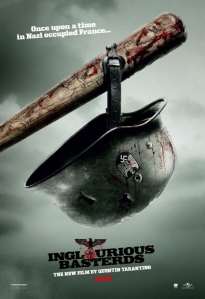 “Inglourious Basterds” is a multi-plotted, revisionist war movie about occupied France during WWII, where an evil genius Nazi Colonel is pitted against a blood-thirsty team of British, Jewish-American, and sympathetic German soldiers and spies who are out to turn the tide in the war. It’s also about a romantic woman with a hidden past and a vendetta who now runs a cinema in Paris, who tries to keep her romantic life while playing her role with all the opposing forces in France, as they head toward a Battle Royal climax. Who will prevail? Hint: I don’t want to give it away, but for those who don’t know… the Nazis lost the war.
“Inglourious Basterds” is a multi-plotted, revisionist war movie about occupied France during WWII, where an evil genius Nazi Colonel is pitted against a blood-thirsty team of British, Jewish-American, and sympathetic German soldiers and spies who are out to turn the tide in the war. It’s also about a romantic woman with a hidden past and a vendetta who now runs a cinema in Paris, who tries to keep her romantic life while playing her role with all the opposing forces in France, as they head toward a Battle Royal climax. Who will prevail? Hint: I don’t want to give it away, but for those who don’t know… the Nazis lost the war.
While "Inglourious Basterds" is as excessive and bombastic as any of Quentin Tarantino’s movies, it was almost restrained in its level of gratuitous blood and gore. In other words, excessive, but not excessively excessive, if that makes sense. And he even included some good slapstick comedy and sweet, melodramatic romance in this long movie.
“Precious: Based on the Novel ‘Push’ by Sapphire” is a great weeper about a fat, illiterate, and pregnant but kind-hearted high-school drop-out who uses her imagination to escape to a better world. She tries to turn her life around when placed in an alternate school writing class, but must deal with her monster of a mother and her miserable home life.
Precious is a good movie with two surprisingly good actresses I had never seen before, that dealt with difficult topics without succumbing to mawkishness.
 “A Serious Man” is a comic drama about a middle class, middle aged, University prof in the midwest 40 years ago who faces a moral dilemma at work, and instability in all directions. He turns to a series of rabbis for help with his marriage, his brother, his neighbours, his children, and the meaning of life.
“A Serious Man” is a comic drama about a middle class, middle aged, University prof in the midwest 40 years ago who faces a moral dilemma at work, and instability in all directions. He turns to a series of rabbis for help with his marriage, his brother, his neighbours, his children, and the meaning of life.
"A Serious Man" is a funny and uncomfortable movie by the Coen Brothers, but seems unsure whether it wants to be a stupid shaggy dog tale or a vortex of existential angst. It ends up being both.
“Up” is a cartoon about a grumpy old man who makes a rash decision to fulfill his and his late wife’s dream of visiting a remote mountaintop, but, who accidentally floats off in his balloon-powered house, with a boy scout on board. Later the two of them encounter the old man’s hero – a Charles Lindberg-type with his own private domain filled with trained, talking dogs – but soon discover their hero is not what they expected. Now it’s up to the old man and the little boy to make things right.
"Up" is an OK animated movie with some funny lines and hilarious talking dogs.
“Up in the Air” is a so-so comedy about a man (who strangely looks and sounds exactly like George Clooney) who travels corporate America firing strangers from their jobs. But is his world of airports, convention centres, offices, and furtive relationships in hotel rooms worthwhile? Or is the unfashionable, slow and homey life of his estranged relatives more “real”?
(The Blind Side was also nominated but I can’t review it, because I haven’t seen it.)
Predictions:
Best Actor: definitely Jeremy Renner in “The Hurt Locker”. WRONG: Jeff Bridges
Best Supporting Actor: (strangely enough, they were all great) it’s a real toss up, I think Stanley Tucci as the creepy neighbour in The Lovely Bones did the best job, but I have a feeling Cristoph Waltz will win. RIGHT
Best Actress: The two young Actresses Gabby Sidibe in Precious and Carey Mulligan in An Eduucation were both outstanding but I think Precious was more dramatic so it’ll probably go to her. WRONG Sandra Bullock (I haven’t seen The Blind Side)
Supporting Actress – I’m pretty sure it’ll go to Mo’nique in Precious. RIGHT
Bets animated feature: I haven’t seen Book of Kells, but of those I saw I thought "The Fantastic Mr Fox" was the best. "Coraline" had a great story. Unfortunately, I’m pretty sure "Up" will win. RIGHT
(I’m also surprised that the excellent Japanese movie "Ponyo", about a fish that turns human, wasn’t even in the running.)
Best Original Script: I hope it’s "The Messenger", a heart-wrenching new drama about war vets who’s job is to tell families that a soldier is dead. NO PREDICTION ("Hurt Locker")
Best adapted script: I hope it’ll be In the Loop, a brilliant British political comic satire about how misinformation and disinformation can lead to war. NO PREDICTION ( "Precious")
Best director will probably go to Catherine Bigelow. RIGHT
Best Picture: Avatar WRONG! (Hurt Locker).
Final score: 4 out of 7 — slightly better than flipping coins.
Another Movie About the Iraq War That’s Not About Iraq: The Hurt Locker
The Hurt Locker, a US wartime drama directed by Catherine Bigelow has garnered an impressive number of Oscar nominations. I saw it last summer and thought it was a good drama, and then thought nothing more about it. So it’s a bit of a shock that it’s suddenly back in the public eye. Let me give you a bit of background. The Director has a mixed record. She was riding high for a while with her tense psychological thriller Blue Steel (1989), about a rookie cop (Jamie Lee Curtis) who freezes up at an armed robbery, and enters into a sort of a sexual battle with the killer. But Bigelow’s career crashed to a halt with the meandering and pointlessly long science fiction drama Strange Days. Not coincidentally, it was written by her then husband, James Cameron. Yeah, him.
So here she is, back again, directing a tense drama.
The Hurt Locker is about Sergeant James, a new replacement in a US squadron that meticulously defuses bombs set by insurgents in Iraq. To the horror and dismay of his fellow soldiers, James behaves like a sort of a superhero, shrugging off the padded suits and headgear, brazenly walking right into the middle of things, picking up bombs and pulling them apart – seemingly unaware, or unwilling to admit that he could get his head blown off in a second. When you gotta go, you gotta go, is his attitude.
He gets along better with an Iraqi kid who plays with a soccer ball near the bass camp – he calls him Beckham – than with his teammates. The danger and violence wear him down, but his true fear comes when he sheds his uniform and is forced to deal with the mundane reality of his life at home, back in America.

The Hurt Locker is one of a long stream of American movies about the war in Iraq – Jarhead (2005), Redacted (2007), Stop-Loss (2008), and the very good documentary Gunner Palace (2004)– but they all have the same problem: they all take the point of view of US soldiers who, seemingly through no fault of their own, find themselves in a strange country engaged in a senseless war filled with violence, death, and murder. Very much like US movies about the war in Vietnam. But you almost never see a scene in any of these movies, including The Hurt Locker, that is told through the eyes of the Iraqis.
Now American movies, or movies from any country for that matter, are going to take the viewpoint of people the viewer can identify with, and it’s always easier to identify with the people who look or sound like you.
But it’s almost disingenuous to portray the US military in general as finding itself there in Iraq — just coincidentally — as opposed to being part of the same army that invaded it on false pretenses.
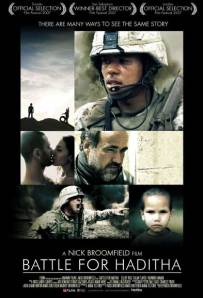
The one exception to this is documentary maker Nick Broomfield’s great, unreleased feature drama Battle for Haditha, made in 2008, in which he shifts back and forth between Iraqi civilians, insurgents, US soldiers on the ground, and officers far away at computer consoles pressing buttons and giving orders. It’s one of the few Iraq war movies that lets the audience see the war the way some Iraqi civilians see it, from inside their own homes.
The Hurt Locker is a good, tense, drama, with great acting – especially unknown Jeremy Renner in the main role. It has some interesting details – the soldiers spend their off hours playing the video game Call of Duty, shooting up the enemy for fun. But it also reduces an actual shootout – like one stalemate in the desert where they shoot at snipers poking up their heads in different windows of an abandoned house on a hill – to what seems like nothing more than a game of whak-a-mole.
– Daniel Garber, February 5, 2010

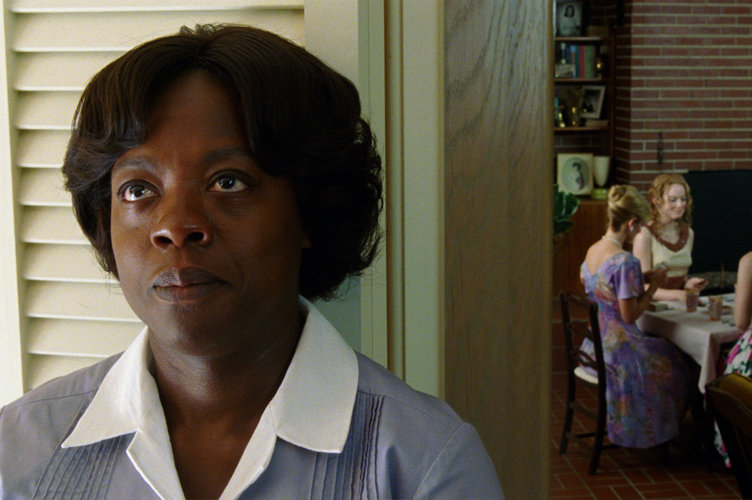


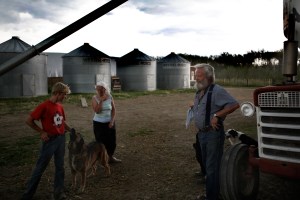
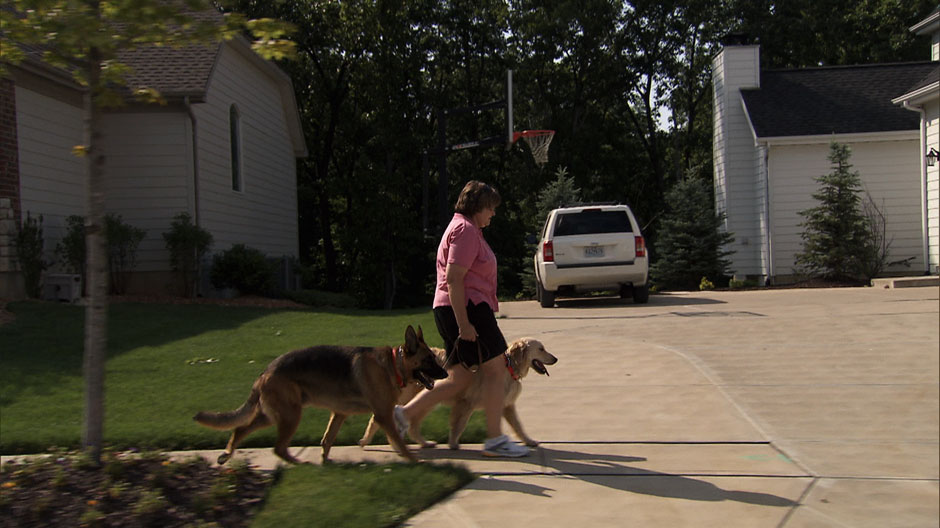

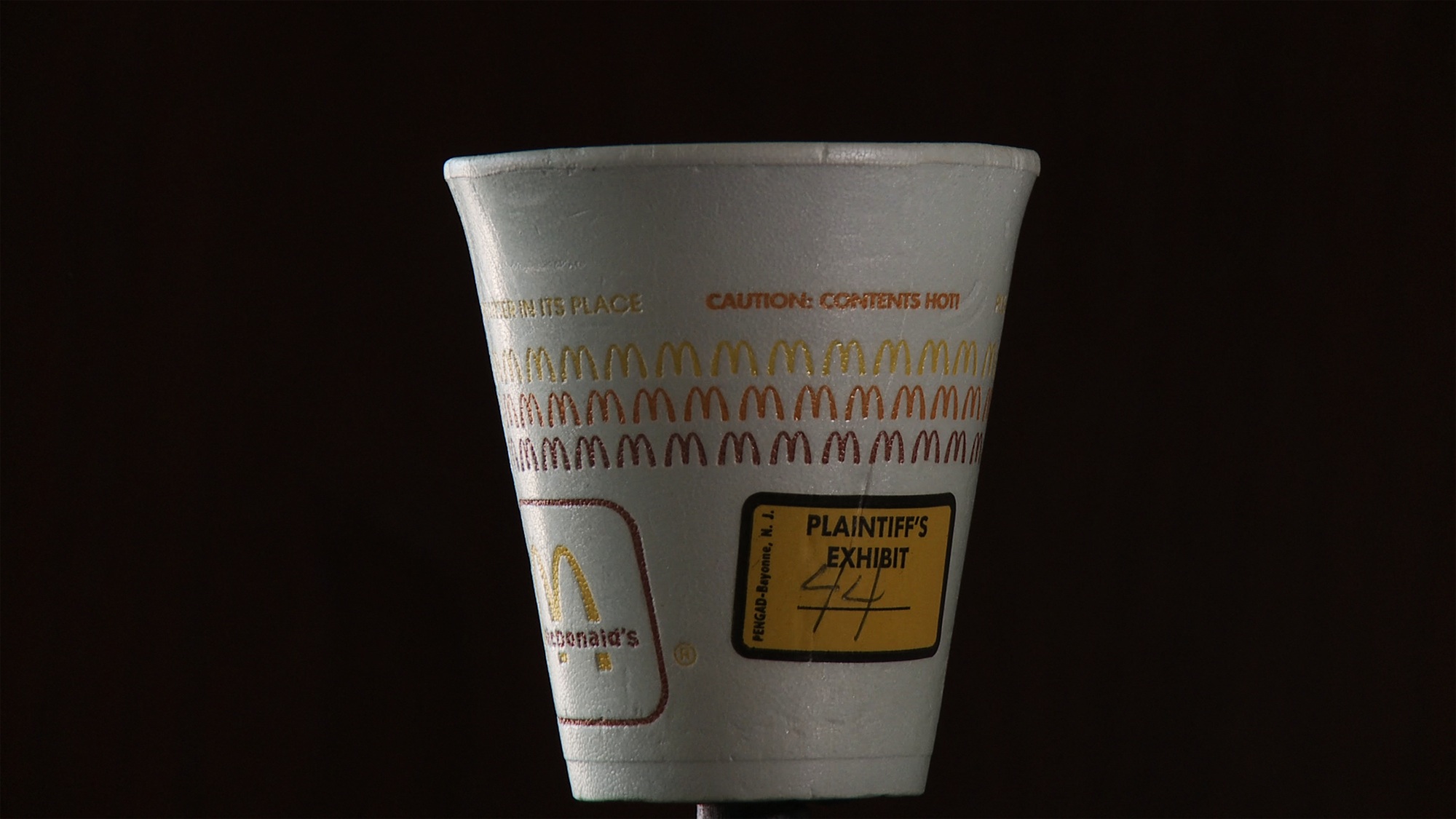


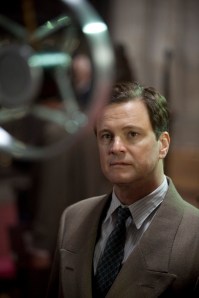
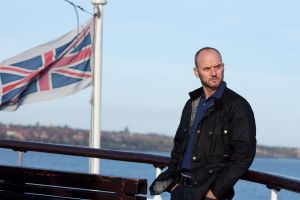


1 comment